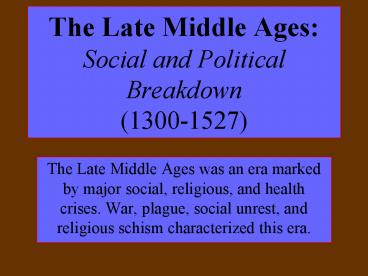The Late Middle Ages: Social and Political Breakdown (1300-1527) - PowerPoint PPT Presentation
1 / 18
Title:
The Late Middle Ages: Social and Political Breakdown (1300-1527)
Description:
War, plague, social unrest, and religious schism characterized this era. ... a result of decades of overpopulation, economic depression, famine, and bad ... – PowerPoint PPT presentation
Number of Views:200
Avg rating:3.0/5.0
Title: The Late Middle Ages: Social and Political Breakdown (1300-1527)
1
The Late Middle AgesSocial and Political
Breakdown(1300-1527)
- The Late Middle Ages was an era marked by major
social, religious, and health crises. War,
plague, social unrest, and religious schism
characterized this era.
2
The Hundred Years War and the Rise of the
Nationalist Sentiment
- During the Middle Ages, tremendous violence and
political unrest led to the breakdown of European
governments. - Toward the end of the period, monarchs in England
and France began to reassert their power. - The Hundred Years War was the result of their
struggle for control.
3
The Hundred Years War (1337-1453)
- The Hundred years War began when the English
king Edward III claimed his right to the French
throne after the death of Charles IV. - The territorial proximity of England and France
and their quarrel over rights to Flanders
exacerbated the dispute.
Edward III
4
Success and Weakness in the War
- English success in the war was due to its
military superiority and its use of weaponry like
the longbow.
- French weakness was due to territorial
infighting and a lack of leadership.
5
Sieges and Battles
- Fighting consisted primarily of sieges and raids.
- The battles of Crécy (1346), and Poitiers (1356),
and Agincourt (1415) were significant victories
for the British. - .
6
Joan of Arc (1412-1431)
- A peasant from Domrémy who claimed she heard the
voices of God, led the French victory in the
Battle of Orleans. - Joan served as an inspiration for the French, who
eventually defeated the English and won the war. - Joan was later burned at the stake at Rouen as a
heretic for refusing to recant her beliefs.
7
The Black Death
- Also known as The Bubonic Plague, came about
as a result of decades of overpopulation,
economic depression, famine, and bad health and
hygiene in some European regions.
8
Although there were terrible famines and the
Black Death deteriorated the population, wiping
out whole villages and townships, this age left
so few able-bodied people that they were unable
to tend the fields and to plant the next years
grain. In some cities people certainly starved
through ignorance and prejudice. There were many
natural foods, plants and fruits, which were
rejected and avoided due to lack of knowledge and
understanding.
9
The Black Death
- The Black death was named for the discoloration
of the body. - It is believed to have been introduced by
seaborne rats from the Black Sea area. - By the early fifteenth century, western Europe
had lost as much as 40 of its population to the
plague.
10
Whos to blame?
- Lack of sophisticated medicine led to
superstitions about the reasons for the plague,
including poisonous fumes released during
earthquakes and a corruption in the atmosphere. - Jews were sought as scapegoats for the plague and
were persecuted.
11
Remedies and Self-Inflicted Pain
- Popular remedies against the plague included the
use of leeches. - Flagellants believed that beating themselves
until they bled would bring about divine
intervention.
12
Economic Effects
- Farm laborers decreased in numbers
- Peasants rebelled against efforts by governments
to limit their wages - Opposition to such legislation spurred the
English peasants revolt of 1381 - .
13
Ecclesiastical Breakdown and RevivalThe Late
Medieval Church
- Pope Innocent III (r. 1198-1216) continued to
transform the church into a secular power,
creating a papal monarchy - Pope Urban IV (r. 1261-1264) continued the
secularization of the church by establishing its
own law court - The College of Cardinals became politicized.
14
Papal Legacies
- Pope Boniface VIII (r. 1294-1303) refused the
English and French efforts to tax the clergy, and
issued a bull, Clericis laicos, which forbade
taxation of the clergy without papal approval. - Boniface was forced the make a concession to
Phillip the Fair of France, but the dispute led
the two into further debates. - In 1302, Boniface issued the bull, Unam Sanctum,
which declared that temporal authority was
subject to the power of the church.
15
- Pope Clement V moved the papacy to Avignon, to
avoid the French King and Rome. - The time in Avignon was called the Babylonian
Captivity, in an allusion to the biblical
bondage of the Israelites.
lt-- Pope Boniface VIII
Pope Clement V --gt
16
- Pope John XXII (r. 1316-1417) tried to restore
the papacy of Rome. - John Wycliffe and John Huss led the popular lay
movements, the Lollards and the Hussites, that
protested the rights of the papacy.
Pope John XXII William of Ockham Marsilius of
Padua John Wycliffe John Huss
17
The Great Schism (1378-1417)
- The Great Schism occurred when Pope lt-- Clement
VII, a cousin of the French king, was elected by
a council of cardinals just five months after
they had elected an Italian archbishop, Pope
Urban VI. --gt - Two papal courts now claimed the right to power.
- Cardinals disposed both popes and elected a new
pope, Alexander V.lt-- - For a time there were three popes who claimed
spiritual authority.
18
The Council MovementAKA Conciliarism
- An effort to control regulate actions of the pope
by councils, grew during this time. - In 1414, the council of Constance met.
- In a document known as the Sacrosancta, the
council recognized the Roman pope Gregory XII,
and one pope ruled.

